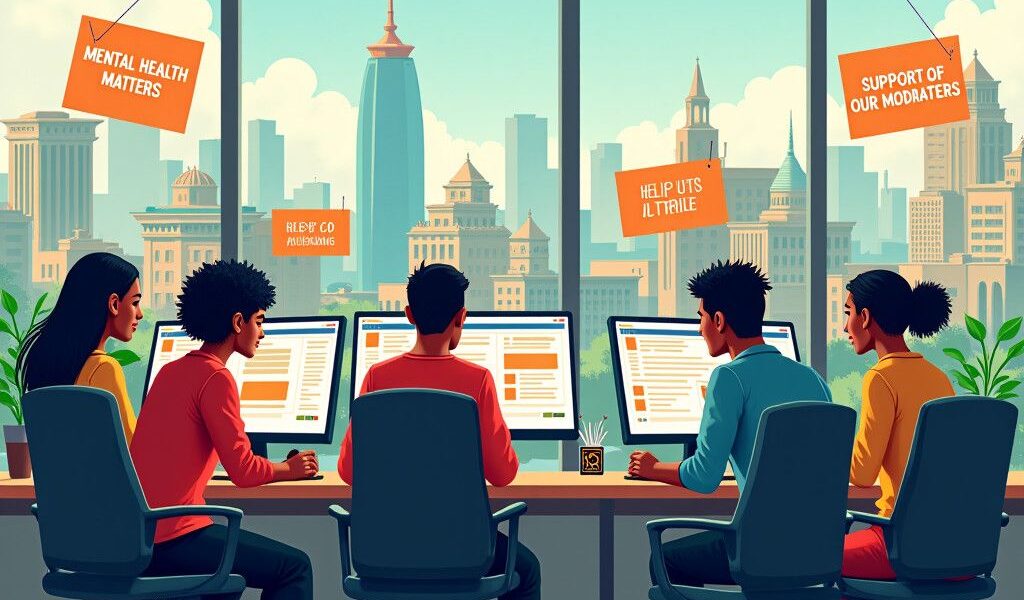Ethiopian Content Moderators Claim Neglect by Meta
In an alarming revelation, former Ethiopian content moderators for Meta have come forward, detailing their harrowing experiences and the threats they faced. These moderators, responsible for overseeing user-generated content, claim that the tech giant has neglected their safety, raising serious questions about the ethical practices of multinational corporations in regions fraught with conflict.
According to reports, these moderators were tasked with monitoring content on Meta’s platforms, including Facebook and Instagram, where violent and extremist material often emerged amid Ethiopia’s ongoing civil conflict. They detailed encounters with Ethiopian rebels who issued chilling threats, leaving the moderators feeling vulnerable and unsupported. The situation is compounded by claims that Meta’s contractors largely ignored their requests for assistance and safety measures. This neglect highlights a broader issue regarding the responsibilities of global tech companies towards their workers, especially in high-risk environments.
The moderators described a toxic work environment characterized by a lack of resources and insufficient training. Many expressed that they were not adequately equipped to handle the content they were meant to moderate. They reported being overwhelmed by the sheer volume of harmful content that could incite violence or promote hate speech. In certain instances, they were left to navigate these challenges without guidance, leading to significant emotional distress.
This scenario raises important questions about the effectiveness of content moderation practices employed by Meta. Content moderation involves not only removing inappropriate content but also ensuring that those tasked with this responsibility are safe, mentally healthy, and have the necessary training and resources. Without these essential elements, the quality of moderation diminishes, putting both the moderators and the wider community at risk.
Moreover, this situation is reflective of a concerning trend in the gig economy, where workers are expected to perform high-stakes jobs without adequate support. The reliance on contractors to manage such critical tasks introduces another layer of complexity. Many of these contractors are not employed directly by Meta, which can lead to a disconnect between the company’s corporate ethos and the lived experiences of its workers.
To contextualize this issue, consider the case of another major tech company, Amazon. Reports have surfaced regarding the treatment of warehouse workers who have faced dangerous conditions without proper safety protocols. These parallels suggest a pervasive issue across the technology sector regarding how employees, particularly those in vulnerable positions, are treated when navigating the complexities of modern content moderation.
The implications of this neglect are far-reaching. First and foremost, it raises ethical concerns about corporate accountability. How can companies like Meta ensure that their workers, particularly in conflict regions, are protected? This calls for a reevaluation of company policies and a commitment to providing adequate resources for crisis management and emotional support.
Additionally, the moderators’ stories emphasize a critical need for more transparent communication from Meta regarding its content moderation strategies and the measures taken to protect its workers. Furthermore, investing in training programs that address the unique challenges of content moderation in politically unstable regions may foster a safer working environment.
There is no denying that content moderation plays a vital role in maintaining healthy online spaces. However, as the experiences of Ethiopian moderators illustrate, it is essential that the individuals conducting this work are granted the same level of respect and care often extended to other professionals in high-stress roles. If Meta—and similar companies—wish to be seen as leaders in this space, they must prioritize the well-being of their content moderators, fostering an environment where they can effectively perform their duties without threat or neglect.
In conclusion, the claims from Ethiopian content moderators shine a light on urgent issues within the tech industry concerning worker safety and accountability. As discussions surrounding the ethical implications of content moderation continue to grow, it is crucial for companies to act decisively to protect their employees and uphold their commitment to ethical practices. Ignoring these challenges not only endangers the safety and mental health of content moderators but potentially jeopardizes the integrity of the platforms they serve.








